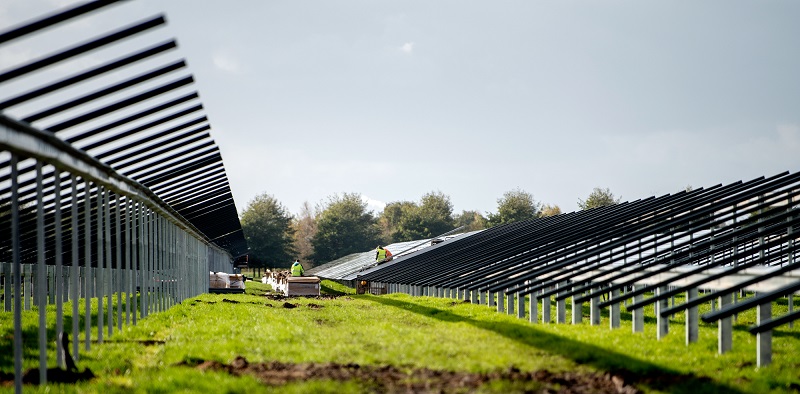As in all emerging PV markets with a high population density and relatively limited availability of land, the Netherlands – which has witnessed strong development in large-scale solar in the past two years under the SDE+ renewable energy policy – is dealing with fears the development of big solar parks will lead to a massive loss of agricultural land.
To refute the widely held belief, Dutch solar energy association Holland Solar has provided figures based on scientific research conducted by the Energy Research Center of the Netherlands, Utrecht University and TKI Urban Energy, that it claims demonstrate the occupation of agricultural land by solar will be limited to a minimal percentage of available farming sites.
According to the numbers, if the Netherlands reaches its 2030 solar target of 6 GW of installed capacity, only 35 square kilometers out of 20,350 square kilometers of available agricultural land will be required – just 0.17%. That percentage would rise to only 0.5% if the country reaches 16 GW of installed PV capacity by 2050, as forecast by the institutions that performed the study.
Holland Solar also stressed ground-mounted solar parks are needed to help the nation hit its climate goals, as aiming to reach them by relying solely on rooftop PV is unrealistic.
Holland Solar added it will work with the Dutch Association for Sustainable Energy (NVDE) and the Agricultural and Horticultural Organization Netherlands (LTO) to ensure a correct and environmentally sustainable integration of big solar plants into the country’s agricultural ecosystem.
The Netherlands had installed PV capacity of around 2.7 GW at the end of last year. Of that capacity however, only a small proportion is represented by operational solar parks, with most of it residential and commercial rooftop systems installed under net metering.
Around 5.9 GW of capacity has been allocated under the SDE+ program since it was launched in 2008. Solarmagazine, however, recently reported grid-connected PV capacity under the scheme is only slightly above 700 MW.
This content is protected by copyright and may not be reused. If you want to cooperate with us and would like to reuse some of our content, please contact: editors@pv-magazine.com.




By submitting this form you agree to pv magazine using your data for the purposes of publishing your comment.
Your personal data will only be disclosed or otherwise transmitted to third parties for the purposes of spam filtering or if this is necessary for technical maintenance of the website. Any other transfer to third parties will not take place unless this is justified on the basis of applicable data protection regulations or if pv magazine is legally obliged to do so.
You may revoke this consent at any time with effect for the future, in which case your personal data will be deleted immediately. Otherwise, your data will be deleted if pv magazine has processed your request or the purpose of data storage is fulfilled.
Further information on data privacy can be found in our Data Protection Policy.